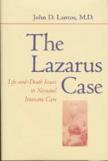Sustaining Baby
While the majority of the 53,000 babies born prematurely each year in the United States would have died soon after birth if they had been born years ago, this improvement is not an unmitigated success story, since a good number of these children will endure long-term suffering and disability. John Lantos, professor and section chief of general pediatrics at the University of Chicago who has written or edited several books in the area of medical ethics, takes up the larger issues of both neonatal care and our medical culture, employing reflective bioethicsi.e., looking beyond narrowly circumscribed issues such as the distinction between ordinary and extraordinary means, or what constitutes informed consent, out to larger considerations of the cultural and medical contexts in which these individual discussions ought to be undertaken.
A malpractice suit, Lantos claims, looks for clear-cut decisions of right and wrong or competence and negligence, but the real world is rarely, if ever, so distinctly divided. Lantos notes that litigation resembles our public morality plays, but these contemporary scripts rarely take into sufficient account the complex moral ambiguity that would separate a fuller, messier account of reality from the clearer, though ultimately incomplete and misleading fiction of the legal drama.
Asking questions of right and wrong requires that one be willing to invest in the considerable effort to inquire deeply into a whole range of issues and aspects that at first glance may seem to be irrelevant to the judgment of rightness and wrongness, guilt or innocence, responsible competence or negligent malpractice. But Lantos shows convincingly that this further reflection is essential to a true resolution of these questions. Speaking in reference to his own first successful resuscitation of a preemie who would die only two days later, Lantos observes that modern bioethics focuses on those equations in which the sum of a series of right actions is an outcome that seems terribly wrong. Thus, we need to expand the terms considered in the equation. One of these morally relevant features is consideration of the quality of life; but this criterion has become such a shibboleth in many ethical discussions that merely uttering it renders one heterodox in certain circles and cuts off any further consideration of the patient’s actual situationwhich is foundational to a proper application of the classic principle about the use of ordinary and extraordinary means.
If medical science moves toward moral expertise, it must become more inclusive and synthetic than it has been heretofore and must include not only anatomy and physiology but sociology, cultural anthropology, psychology and other areas if it is to be truly scientific and trustworthy in both methodology and conclusions. The methodology and many of the questions and reflections Lantos presents in his fictional deposition as an expert witness in pediatrics translate easily enough into other areas of health care ethics.
Though Lantos has clearly read widely, it is somewhat surprisinggiven the nature of the bookhow little Catholic casuistry has entered his discussion. For example, he laments medical technologies that, in the course of sustaining life, end up causing severe hardship to patients and/or their families. He concludes that we don’t have a framework for understanding the limitations and the unsustainability of a medicine that is both powerful and powerfully inadequate. Many ethicists would disagree that such a framework is lacking, since the whole casuistical tradition behind the distinction between ordinary and extraordinary means aims to provide just such a frameworkat least in part. While Lantos is not wholly unaware of this tradition, he does not seem to be as conversant or at ease with it as we might hopeor perhaps this weakness is a doctor’s hesitancy to stroll too freely in the garden of the moral theologian. Another weakness of the book is its title. While the governing metaphor of Lantos’s reflections is a fictitious legal deposition as an expert witness in a neonatal malpractice suit, introduced in the opening chapter (Somebody Will Pay), the book really is much broader than suggested by the subtitle, Life and Death Issues in Neonatal Intensive Care. Because of this, many people who might very profitably read this engaging work will unfortunately put it aside, thinking that this text is a bit too specialized or esoteric for their tastes or needs.
Perhaps the most laudable feature of this book is the realism with which Lantos forces us to acknowledge the inherent limitations of any concrete medical practice. As he observes, a medical system that demands decisions of doctors under conditions of uncertainty cannot also demand perfection in those decisions. Mistakes are the price of being human. This is a telling critique indeed, since it requires that we differentiate honest human mistakes from culpable moral failure. One is not equivalent to the other, and if Lantos’s reflections are taken under deeper consideration, we can build on this crucial distinction and move much further along the path of bioethical knowledge. Lantos argues that if sincere and well-motivated practitioners are not living by the theory, then either the theory needs to be re-examined and changed or the behavior of the practitioners needs to be altered. A number of factors suggest that the problem is with the theory. Mistakes in Context (the title of Chapter 9) do not necessarily involve medical malpractice, much less moral culpability.
Errare humanum est, and every doctor must be human.
This article also appeared in print, under the headline “Sustaining Baby,” in the April 29, 2002, issue.








